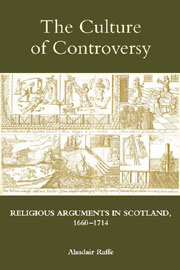Book contents
- Frontmatter
- Contents
- List of Maps and Illustrations
- Acknowledgements
- Abbreviations and Conventions
- Map 1 Scottish counties
- Map 2 Presbyteries, 1660–1714
- Introduction
- Part I Controversial Discourse
- 3 The Covenants and Conscientious Dissent
- 4 Persecution
- 5 Fanatics and Enthusiasts
- 6 Clerical Reputations
- Part II Controversial Action
- Conclusion: Concepts and Consequences
- Glossary
- Bibliography
- Index
- STUDIES IN MODERN BRITISH RELIGIOUS HISTORY
6 - Clerical Reputations
from Part I - Controversial Discourse
Published online by Cambridge University Press: 05 February 2013
- Frontmatter
- Contents
- List of Maps and Illustrations
- Acknowledgements
- Abbreviations and Conventions
- Map 1 Scottish counties
- Map 2 Presbyteries, 1660–1714
- Introduction
- Part I Controversial Discourse
- 3 The Covenants and Conscientious Dissent
- 4 Persecution
- 5 Fanatics and Enthusiasts
- 6 Clerical Reputations
- Part II Controversial Action
- Conclusion: Concepts and Consequences
- Glossary
- Bibliography
- Index
- STUDIES IN MODERN BRITISH RELIGIOUS HISTORY
Summary
The controversy between presbyterians and episcopalians drew in arguments about styles of piety and public worship. As chapter 5 reveals, the critics of enthusiasm sometimes ridiculed the laity's devotions, but more often their chief target was the presbyterian clergy's conduct of worship. This chapter focuses on other aspects of the clerical character, especially the moral rectitude and sincerity that Scots expected of their ministers, and the consequences of individual ministers' moral failings and indiscretions. Examining these themes, the chapter shows how presbyterians could answer their opponents' attempts to caricature presbyterianism as enthusiasm. From stories of the scandals of particular episcopalian ministers, and the moral laxity of Restoration society in general, emerged a stereotype of the debauched and time-serving episcopalian clergyman, ethically and intellectually inferior to his presbyterian rivals. By emphasising the immorality of episcopalian ministers, their bishops and noble patrons, presbyterians could shift the debate away from allegations of doctrinal extremism to questions of discipline and sincerity. Condemned by their critics as excessively pious and introspective, presbyterians could respond that the episcopalians were worldly hypocrites. By the time of the revolution, the debased estimation of the episcopalian clergy provided an easy target for presbyterian pamphleteers. Moreover, it was the pretext for a purge of supposedly scandalous ministers and teachers from the Church and universities. The presbyterians maintained a reputation for high moral standards, but this character left some presbyterian ministers vulnerable to charges of hypocrisy.
- Type
- Chapter
- Information
- The Culture of ControversyReligious Arguments in Scotland, 1660-1714, pp. 149 - 176Publisher: Boydell & BrewerPrint publication year: 2012



